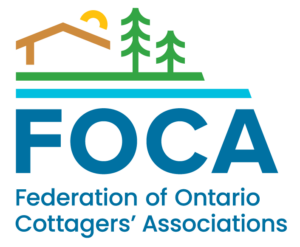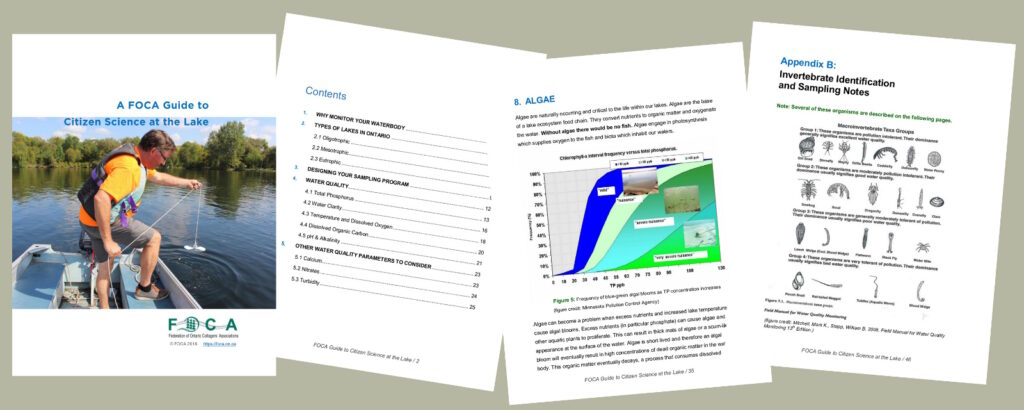
Community scientists and lake stewards are essential in helping to maintain and improve the quality of Ontario’s inland lakes.
We all love our waterfront environments, and want to ensure that the activities and experiences we treasure today will still be possible for future generations. Having dedicated volunteers who take the time to measure and report on changes will play a vital role in keeping our waterbodies healthy.
Understanding the state of our natural resources can be significantly enhanced by citizen science, which supports our knowledge base and augments the information garnered through the Province of Ontario’s natural resources science and research.
Citizen or community scientists are involved in the Lake Partner Program of water quality monitoring, as well as numerous “watches” and surveys of flora, fauna and environmental conditions.
Find out more about how you can get involved, and why Citizen Science matters, in this short video introduction from FOCA, featuring some of our great volunteer lake associations ->
The video above was filmed and produced for FOCA by Chelsie Xavier-Blower as part of the Environmental Visual Communications program, a joint initiative of Fleming College and Royal Ontario Museum.

May 10, 2025 – Norman Yan – The role of citizen scientists in sustaining the Muskoka watersheds (MuskokaRegion.com)
FOCA's "Guide to Community Science"
Download a copy of FOCA’s digital publication, A Guide to Community Science at the Lake (2018), which includes chapters about why to monitor, how to classify your lake, designing a water sampling program, an overview of Ontario community science monitoring programs, and an introduction to invertebrate sampling and identification.
Ongoing monitoring has benefits for our future. Long-term data shows baselines and trends within watersheds, and highlights outliers or changes. Being involved as a community scientist can connect you to your local community and your natural environment.
Chapters include: why monitor?; how to classify your waterbody; designing a water sampling program, and more.
For more about community science monitoring programs for adults and kids to consider, see Appendix “A” of the FOCA Community Science Guide, above.
Related & Earlier News:
Citizen science helped expose the biggest wildlife die-off ever documented | Aspen Public Radio
Citizen Science: The Hidden Key To Saving The Planet | Ethic
September 30, 2022 – The Role Of Citizen Scientists In Monitoring Lake Conditions (Muskoka411.com)
–
August 2022 – New study of Citizen Science volunteers & Trust in Science: A new article, published in the journal Environmental Sociology and written by FOCA and our partners at the Toronto Metropolitan University & Fairfield University of Connecticut, addresses these themes: Stewarding relations of trust: citizen scientist perspectives on fostering community trust in science (published online Aug.17, 2022).
- Read FOCA’s related Media Release, with more study details (PDF, 3 pages)
- Ten free copies of the full article are available from the publishers, on a first-come basis, using this link.
The article springs from a qualitative case study of our Lake Partner Program volunteers that suggests lake stewards see themselves as translators and emissaries of environmental science within their communities. Trust in, and the credibility of, citizen science is related to:
- the reputation of these individuals within their communities,
- their effectiveness in translating the science into accessible local messages,
- and the belief that professional scientists and government agencies value the work that they do, and are committed to supporting it, financially and institutionally.
MEMBERS: login below to view FOCA’s 2021 webinar with our partners from the Gordon Foundation providing a preview of the DataStream hub for the Great Lakes region which includes the Lake Partner Program data.
If you participate in water quality data collection of any kind in the Great Lakes and Saint Lawrence region, you’ll want to hear about DataStream and the map and visualization tools that will make it easy to explore results, and see where else monitoring is taking place around you.
- Watch the webinar recording (online, 1 hour)
- Download the event slides (PDF, 6 MB)
- click the image above to launch the webinar recording (1 hour)
- download the event slides (PDF, 6 MB)

Please note: the following is archival material, and some links to third-party resources may no longer be active.
October 2, 2021 – ‘People protect what they love’: citizen scientists collect and share data on watersheds in the Skeena, B.C. region (Narwhal)
July 10, 2020 – This isn’t the time to let environmental protection and monitoring slip; Reliable datasets are needed to effectively model and predict what the environment’s future will look like (CBC News)
October 2019 – FOCA participated in the annual Lake Links workshop, as a presenter and participant. The theme this year was “Applications for Citizen Science on your lake.” Download handouts, slides and videos from the day’s presentations, here: https://watersheds.ca/lake-links-2019/
August 2018 – link to this CBC News article about citizen scientists helping to track the movement of black widow spiders in northeastern US and southern Ontario.
For related information, visit FOCA’s additional webpages:
Lake Partner Program of water quality monitoring

